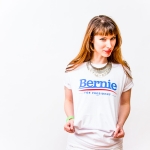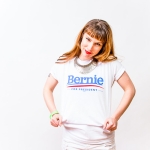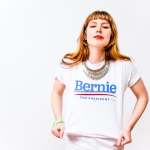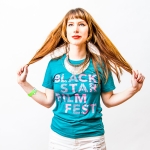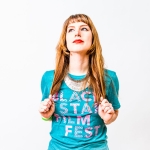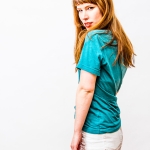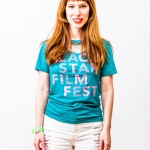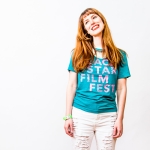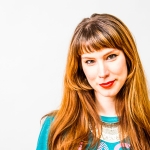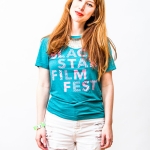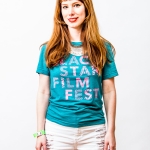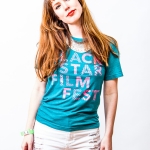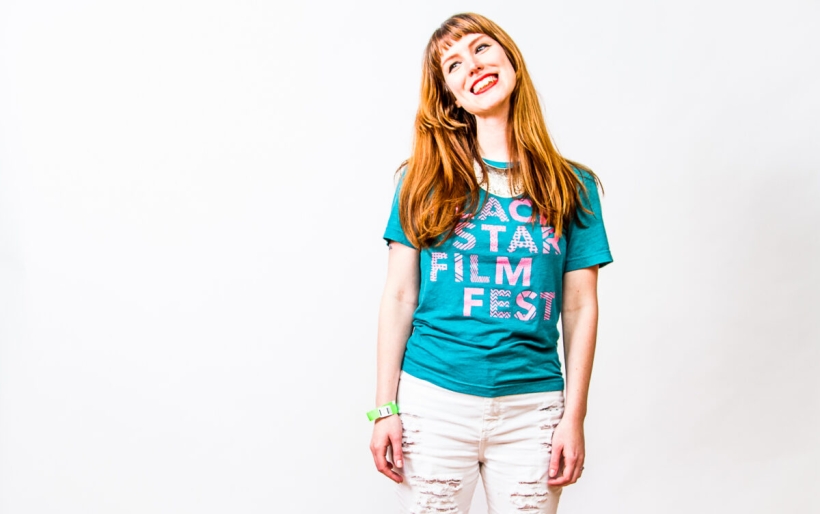
Kate Faust | photo by Josh Pelta-Heller for WXPN | koalafoto.com
The High Key Portrait Series: Kate Faust
“High Key” is a series of profiles conceived with the intent to tell the story of Philly’s diverse musical legacy by spotlighting individual artists in portrait photography, as well as with an interview focusing on the artist’s experience living, creating, and performing in this city. “High Key” will be featured in biweekly installments, as the series seeks to spotlight artists both individually and within the context of his or her respective group or artistic collective.
Kate Faust’s music can be difficult to try to describe, and trying only leaves you with a couple handfuls of hybridized words interrupted by dashes or slashes that mostly end in “-pop.” Things can get ugly for a music writer.
So when it comes to unique genre-bending voices like hers, it’s best to just tune into her Soundcloud for her latest releases, her innovative impressions of Weezer or Radiohead songs, and her sprawling original compositions offered as recorded or remixed in collaborations with leBeet.
Faust will release new music in the New Year, but between now and then she’ll make a new cover EP, Undercover, available for free, with visuals and live performances of each track. Catch this hometown heroine here soon (say for example at her holiday show at Johnny Brenda’s on December 12th, with Work Drugs and Kississippi), because her 2016 plans will see her making more of a national splash on both coasts.
The Key: Are you a Philly transplant or a Philly native?
Kate Faust: Transplant. I’m originally from Central PA, Lancaster County. Not very far.
TK: Why did you come to Philly and when?
KF: Well my mom’s family’s from here, but I’d never been to the city before, and I guess I came here for college. I didn’t wanna go to college — I told my parents I was gonna be a musician and I didn’t need to go to college, but they said I had to go to college. So one of my friends who was a really good musician back where I lived — we were at prom, he told me he was going to UArts, so I said, well I guess my parents said you have to go to school, and I was like, I guess UArts. Went there, it was my first time in Center City and I like completely fell in love with it. There was like one traffic light in the town I grew up in, Denver. Most people think that it’s Colorado and not Pennsylvania. I ended up going to college, University of the Arts, here, which was pretty awesome, and I think some of the best musicians are here, they live here, they stay here, they incubate here.
TK: How did you first get connected to the Philly music scene?
KF: Well I guess it started out from the band that I was in at the end of high school/beginning of college, that was from Central PA. We started playing shows in Philadelphia, like house shows, and then I joined other bands around here. I met other musicians between just gigging all the time and going to school for music and being in school with other musicians.
TK: Who’s your favorite Philly artist, or which Philly artist influenced you the most?
KF: So, Jill Scott. Hands down, Jill Scott. I mean, the album Who Is Jill Scott?, I think I heard it my freshman or sophomore year in college, and it changed my life. That led me more on a journey. I guess you could say The Roots, of course – I remember my [older] brother listening to Illadelph Halflife when I was a kid. And then also now, in my adult life, a lot of the older R&B artists that I’m now discovering in the past three or four years, like the O’Jays, and all these incredible Philly artists, and I guess even Hall & Oates – I didn’t realize [they] were from the Philly area. And I know Chuck Gamble personally, and I got to see Gamble and Huff before it closed down, and I didn’t realize how many musicians that I loved were a part of MFSB [Mother Father Sister Brother] and The Philly Sound, and how many people went through there. So I think whether you’re from Philly or not, you’ve been impacted by Philadelphia artists, if you have good taste in music. [laughs]
TK: Where’d you play your first show in Philly, and what do you remember feeling being on stage that night in front of a Philly crowd?
KF: Um, I don’t know. If we’re talking about my old band, memorable first couple shows, I know we played a house show in the house of Josh and Jessica Craft (of Conversations With Enemies, now just Conversations) – they had us play in their house back when Jess lived on 16th Street, it must have been 2007, 2008. I also remember playing at The Khyber. The Khyber was the spot I enjoyed playing at with my first band. And I was quite sad when The Khyber turned into a gastropub, because, it’s not like Philly is in need of anymore fucking gastropubs, to be honest. I was just like, are you kidding me, this is like a legendary place where so many of us started out! The Fire would have to be one of them as well. I don’t have a succinct memory, but it would have to be a house show, The Fire and The Khyber. Those are the spots we frequented that would let us have a gig there, where our friends were playing. We mostly just got shows through our friends.
TK: Which Philly music venue if your favorite to play at?
KF: That’s hard to say. I love Underground Arts, and Johnny Brenda’s. I think I like those the best.
TK: What do you love most about the Philly arts scene?
KF: Well, there’s always a feeling that Philly is such a small world and everybody knows everybody, right? But I still feel like, there are so many people I don’t know about, so many bands I don’t know about, and in fact that’s something that I want to change. I wish I was more — I dunno, I can be kinda antisocial, so — I wish I knew more of them. But, the thing about Philly is that — although this is becoming less and less true — it’s still cheap to live here, at least in some places. And so that means that artists can come here and hone their craft and meet other like-minded people without having to worry about whether they’re gonna starve or not, which is becoming more and more difficult. But it’s important for artists that are starting out to have a space where they can be in the scene but also still have time and a sense of safety.
TK: What if anything do you find most frustrating about the Philly arts scene?
KF: Well this is the thing that’s frustrating — if we compared it to another city, say New York or LA, a larger city — there’s no national or international media that’s based in Philadelphia, so it’s hard to break out of the Philadelphia scene. Because I mean I’m an artist who’s honed her craft in Philly — am I a “Philly artist?” No, I’m just an artist. I don’t know what a “Philly artist” means. I don’t feel like I have to be here or stay here. I love it here, and I like that it doesn’t have the hoitey-toiteyness of some other places, but you know, if I play a show in New York, I could have people that work for Okayplayer and Vice in the audience, or at the afterparty, which happens all the time. And I could meet people. In Philly, it’s just insular, the thing is that it keeps cycling through the same thing.
TK: You feel that there’s more of a national level of networking in New York…
KF: There’s a lack of it here [in Philly]… I don’t know where the national publications are really that are based around here..
TK: …which is a shame, because Okayplayer should be a Philly institution.
KF: Yeah. I don’t know, I mean I could be wrong, but I can’t think of when I’ve had a show that I’ve met people that are doing national and international press, or branding, or all these things which could help an artist extend beyond their city of origin. Not that it can’t happen. It has happened for several bands and artists, but. I guess that would be my rant.
And also — I mean this never happens to me now, but I remember when I was younger in the scene — there would be a Phillies game on, and I remember playing a show where they broadcasted the game next to where we were playing, and I wanted to fucking punch everyone in the audience. Like, if you wanna watch a fucking Phillies game, stay in your fucking house. If you wanna come to my show, come to my fucking show. They were afraid no one would come to the show because of a Phillies game, and that’s shitty. Because quite frankly, everyone who plays on the Phillies’ team, are they from Philadelphia? Why do you give a fuck about them? I felt like it was a slap in the face, that a venue would think it’s okay for them to broadcast or project a Phillies game on my show or next to my show? I wasn’t headlining, so I didn’t say anything, but if I was, I would’ve not played. I would’ve walked out. I think that’s bullshit, quite personally.
TK: What’s your favorite way of getting around town?
KF: Well I used to bike everywhere. I drive now. I don’t think SEPTA’s the most efficient thing that it should be. I was just having this discussion why in general in the United States we don’t invest in infrastructure for public transportation, because we have such a problem with emissions, and global warming and climate change. Why is the economy and why is the layout of cities such that you need a car? Why is it that an individual person needs to own a car? It seems silly to me. So I’d say yeah, it’s very frustrating if you have to take SEPTA all the time. They jack up the prices, and the service never gets better, it’s slower…
TK: It’s amazing, right?
KF: It’s amazing! Well you know why, it’s because the wealthy people in the city don’t use SEPTA. And those few stations where they would use it are nicer! And some of the stations are there just because of that. But the vast majority of people that rely on it to get to work, to get to school… I don’t know, I don’t think [SEPTA is] concerned about them.
TK: In terms of your experience living in Philly, which neighborhoods have you lived in, and which made you want to stay or bail?
KF: I’ve lived in Center City and I’ve lived in West Philly and I’m about to move to Germantown literally in like a couple days. And I love Germantown. West Philly’s the shit, we have to say. Because, to be quite honest, I guess this area [Fishtown] is the more hip area, but it’s very gentrified, and the hip places are like very white, very male, very sports-oriented, very sports-bar/beer/gastropub, and that’s not a portrait of the city that I see.
I like West Philly because we have that, right, but we also have an incredible amount of African/Ethiopian restaurants, bars, there’s jazz clubs… you walk down the street and I can see people that look like me and millions of people that don’t look me. And that’s what I want, because I know that’s what the city looks like. And if I have to be a gentrifier, I’d like to know that I’m living in a neighborhood that the families who live there that have cultivated that neighborhood can also exist there, and thrive, and own property, and own businesses, and have their families there. Same with South Philly, I don’t like South Philly really either, although there are more families there, I feel. I just feel like it’s super gentrified and it doesn’t have trees like West Philly does [laughs]. I like trees, maybe because I’m from the country, but I like a little bit of trees with my city.
- Kate Faust | photo by Josh Pelta-Heller for WXPN | koalafoto.com
- Kate Faust | photo by Josh Pelta-Heller for WXPN | koalafoto.com
- Kate Faust | photo by Josh Pelta-Heller for WXPN | koalafoto.com
- Kate Faust | photo by Josh Pelta-Heller for WXPN | koalafoto.com
- Kate Faust | photo by Josh Pelta-Heller for WXPN | koalafoto.com
- Kate Faust | photo by Josh Pelta-Heller for WXPN | koalafoto.com
- Kate Faust | photo by Josh Pelta-Heller for WXPN | koalafoto.com
- Kate Faust | photo by Josh Pelta-Heller for WXPN | koalafoto.com
- Kate Faust | photo by Josh Pelta-Heller for WXPN | koalafoto.com
- Kate Faust | photo by Josh Pelta-Heller for WXPN | koalafoto.com
- Kate Faust | photo by Josh Pelta-Heller for WXPN | koalafoto.com
- Kate Faust | photo by Josh Pelta-Heller for WXPN | koalafoto.com
- Kate Faust | photo by Josh Pelta-Heller for WXPN | koalafoto.com




